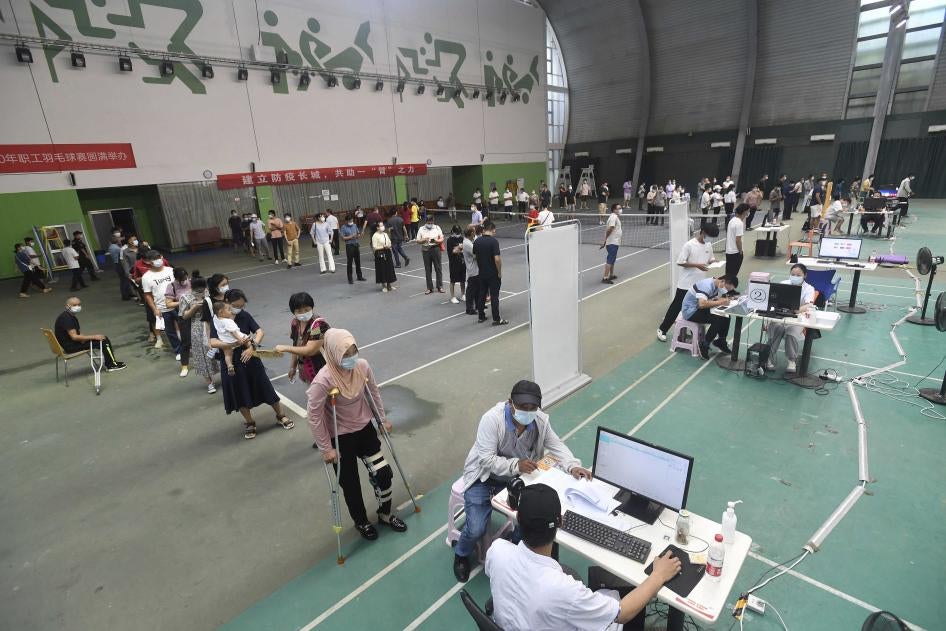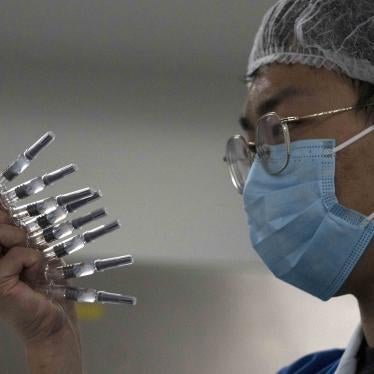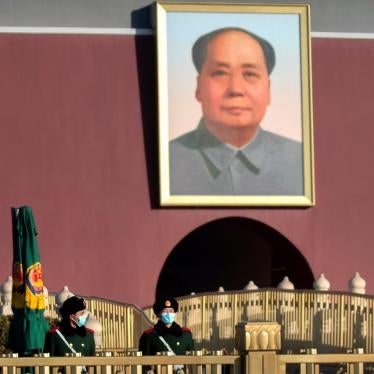On Aug. 31, Hunan police went to Zhang Jianping’s home and questioned him about why he refused to get a COVID-19 vaccine. Both the Ministry of Education and the National Health Commission stipulated that vaccination should only be carried out with informed consent, Mr. Zhang says he told them. He stated explicitly that he was not informed, did not agree and did not want to be jabbed. Later, the police officers forced him into a car heading to a hospital. With several people holding down his legs and arms, Mr. Zhang was injected with a vaccine.
Mr. Zhang’s story is not an isolated account. A frenzy of forced vaccinations began in July after President Xi Jinping set a target of fully vaccinating 1.1 billion people, or 80 per cent of the population, by the end of October. The word qinling, or “zeroing,” was mentioned in many official documents issued by local governments. The Chinese Communist Party secretary in Huairen, Shanxi province, summed up its meaning in a meeting: “No family missed, no person left … achieve comprehensive zeroing for targeted population.”
Vaccinating a large portion of the population against COVID-19 is a critical step toward curbing the pandemic – within China and around the world. But setting population percentage targets without clear protections for people’s rights opens up the possibility of authorities abusing the quota to force jabs. And this is exactly what has played out in recent months across the country.
The Chinese government’s forced vaccination tactics, which go far beyond “mandates” being debated and discussed in other countries, are unlikely to assuage vaccine skeptics’ concerns. Instead, they’re likely to seed distrust. International human-rights law allows governments to require people to be vaccinated – but not through physical force or undue coercion.
In some cases, the authorities don’t use physical force but rely on other coercive tactics without offering regular testing or other reasonable accommodation. In Minhe, the authorities announced that they would cut off welfare, retirement or health-insurance benefits for anyone who refused vaccination. In Huludao, schools conditioned student enrolment on the vaccination of the pupil’s entire family, including parents, siblings and grandparents.
Unvaccinated netizens in Xiaochang and Chongqing have complained that local officials harassed them by constantly phoning them, visiting their homes or taking them to government facilities to question them. In Nanchang, the government said it would pay people who reported on unvaccinated neighbours. Local authorities have also hunted down those who criticized forced vaccinations. For example, Henan police summoned activist Zhang Jie to the police station and forced him to delete social-media posts exposing cases of forced vaccination.
While the central government has stipulated that COVID-19 vaccinations must be based on the principle of “informed, consented, voluntary,” it has not laid out guidelines to hold local authorities accountable for violating the principle. “It wouldn’t be difficult for the central government to find out and punish local officials for not following the central government’s decree. It just chose not to,” said Yang Zhanqing, a U.S.-based activist who has assisted victims of faulty vaccines in China. Meanwhile, the government censored information critical of the Chinese-made vaccines, and spread disinformation about non-Chinese vaccines.
Some people across China resist Chinese-made vaccines as a result of recurring vaccine scandals – a function of authorities’ failure to properly regulate the vaccine market. Sinopharm and Sinovac, whose COVID-19 vaccines have been approved by WHO, were reportedly involved in some of the scandals.
Some families of victims of faulty vaccines have for years demanded accountability – and instead faced police harassment, intimidation and even imprisonment. Last October, Henan province authorities forcibly disappeared He Fangmei, who became an outspoken critic of Chinese vaccine companies when her daughter was diagnosed with a neurological disease after being vaccinated in 2018.He Fangmei has not been heard from since.
Beijing, of course, played a critical role in failing to prevent the spread of COVID-19 at the beginning of the pandemic. It withheld information from the public, underreported cases of infection, played down the severity of the infection and dismissed the likelihood of person-to-person spread.
Censorship, harassment and arbitrary detention throughout the pandemic are deepening the Chinese public’s distrust in the vaccines. If Beijing really wants to drive up the vaccination rate, it should start by releasing detained activists who have advocated for vaccine safety, and instituting transparency measures around vaccine development, safety and regulation. Forcibly restraining people to jab them is not the answer.








